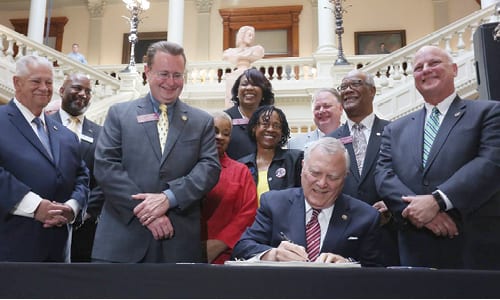
Gov. Nathan Deal has signed HB 930, legislation that creates the state-level Atlanta-region Transit Link Authority (the ATL), which provides a new structure for coordinated transit planning and funding for the 13-county metro Atlanta region. The ATL will be responsible for developing a Regional Transit Plan, as well as identifying and prioritizing the projects and initiatives required to develop region-wide transit. Deal also allotted $100 million in 10-year General Obligation bonds in the FY 2019 budget to fund public transit.
“Georgia is a destination for all types of industries and people from all walks of life to come and enjoy the economic and natural prosperity of our state,” said Deal. “It is projected that the metro Atlanta area will add another 2.5 million residents by 2040, and HB 930 recognizes this growth and provides a coordinated, streamlined and unified approach to prepare for the future of metro Atlanta and the surrounding communities. With the establishment of the ATL, we are taking another significant step to ensure that our modes of transit and mobility are worthy of the No. 1 state for business and the best place for opportunity.
“The initiatives set forth in this legislation will supplement our efforts to build an effective transportation network for the 13 counties covered by the ATL and provide new options to get Georgians to their places of employment, community activities and homes to spend time with family more quickly and efficiently. I appreciate the General Assembly’s leadership, especially the hard work by Speaker Ralston and Lt. Gov. Cagle, for making this bipartisan legislation possible. I also appreciate the commitment and dedication shown by Rep. Tanner and Sen. Beach, the authors of this legislation, in working to improve transportation options for millions of Georgians.”
HB 930 also outlines funding for public transit for approval by the ATL through optional local taxes (TSPLOST) of up to 1 percent for up to 30 years, which counties may apply if they so choose. The 13-county region under the ATL includes Cherokee, Clayton, Cobb, Coweta, DeKalb, Douglas, Fayette, Forsyth, Fulton, Gwinnett, Henry, Paulding and Rockdale counties.
“In the years ahead, Georgia will continue to add millions of new residents to our population – building on our unparalleled reputation as the number one state for business and the capital of the south,” said Lt. Gov. Casey Cagle. “Governor Deal and Speaker Ralston should be commended for their commitment to building a stronger infrastructure for all of Georgia. I’m proud to join these exceptional leaders in advancing this truly historic legislation that will allow Metro-Atlanta counties to strategically expand our public transportation network with local decision-making, reduce traffic congestion, and make the necessary investments to ensure our economic momentum will only continue to accelerate.”
The ATL will be attached to the Georgia Regional Transportation Authority (GRTA) for shared administrative resources and will be governed by a 16-member board. 10 of these members will represent 10 new, specially created Transit Districts and will be chosen by a combination of county commission chairs and a caucus of local legislative delegations. One mayor, to be selected by a caucus of mayors from the municipalities located within each district, will also sit on the board. The board’s chair will be appointed by the governor and the vice-chair will be selected annually by a vote of the board members. Two board members will be appointed by the speaker of the House and two board members will be appointed by the lieutenant governor. The commissioner of the Georgia Department of Public Transportation will sit on the board as an ex-officio, non-voting member. GRTA and State Road and Tollway Authority Executive Director Christopher Tomlinson will serve as the ATL’s interim director.
“This legislation helps us look at transit as part of our overall transportation infrastructure in the Metropolitan Atlanta area,” said House Speaker David Ralston. “It will enable us to work together to mitigate congestion, improve freight logistics and stimulate economic growth. I appreciate all the stakeholders who worked with us in good faith to arrive at this moment, and I especially thank Chairman Tanner and all the members of the House Transit Commission for their leadership in this important effort.”
“House Bill 930 creates a seamless, unified transit governance and funding structure across metro Atlanta, and I’m proud that after years of work on this measure by countless individuals, it will now be signed into law,” said Rep. Kevin Tanner. “I’d like to especially thank Governor Deal and Speaker Ralston for their leadership on this issue and for their willingness to think boldly, as we work together to solve our region’s transportation challenges.”
“This legislation provides the framework for the region to come together to provide our citizens the opportunity to cross jurisdictional lines in seamless, efficient, clean and most of all safe method when riding transit,“ said Sen. Brandon Beach. “I want to thank Governor Deal for his leadership on infrastructure investment that has been vitally important for Georgia being the number one state to do business for five consecutive years.”


![Validate my RSS feed [Valid RSS]](https://web.archive.org/web/20240108205913im_/https://ocgnews.com/wp-content/uploads/2022/07/valid-rss-rogers.png)
